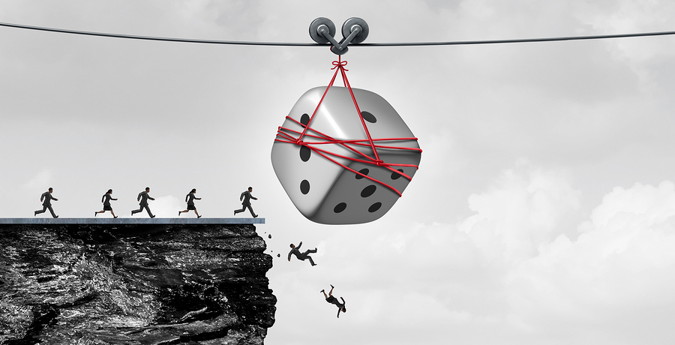Do People Gamble to Win or to Make a Profit?
 Gambling is something that many people will look at from the outside and think that players are simply trying to get rich easily. The perception is that gamblers place sports bets or play casino games because they want to hit a huge payout or jackpot win. However, is this always the case? Is it ever actually the case? Or are bettors simply more interested in experiencing the thrill of a win, regardless of how much the reward for it is?
Gambling is something that many people will look at from the outside and think that players are simply trying to get rich easily. The perception is that gamblers place sports bets or play casino games because they want to hit a huge payout or jackpot win. However, is this always the case? Is it ever actually the case? Or are bettors simply more interested in experiencing the thrill of a win, regardless of how much the reward for it is?
Is gambling in general just a part of our human nature? Does everybody have a bit of a gambling side, potentially hidden away from them? Well, possibly so. But some people do take it a lot more seriously than others, utilising gambling as a way of earing money as well as experiencing a thrill. For most people, though, it is the thrill of the victory rather than the potential for winning huge amounts of money that is the main motivation, even if overall that doesn’t guarantee a profit.
Many people are loss averse by nature, this is where the pain of a loss outweighs the joy of an equivalent gain. This can create situations where people place many smaller bets on likely outcomes over placing bigger bets on less likely outcomes, even if there is value in doing so. In effect the many little wins are a bigger psychological motivation than actually trying to find value in odds that guarantee an overall profit. This is not unexpected given gambling to most people is a leisure pursuit and making us feel good is part of the point, but it does mean that most people are predisposed to lose money in the long run. As the adage goes ‘the house always wins’ and one way it wins is by exploiting the bias people have to winning over necessarily making money.
Here we look at some of the reasons why people choose to gamble and then figure out if there is more to the theory that players want to win more so than make profit.
Reasons Why People Like to Gamble
 It’s true to say that some people engage in gambling for the chance of receiving big wins. There is that mindset that they may hit a huge jackpot payout and be able to live out their days with mountains of cash behind them. And that is achieved by doing little more than spinning the reels of a slot, having a great hand at poker or buying a lottery ticket, for example. Of course, that mindset can be very deadly when it comes to gambling, leading some bettors to deposit more money than they can afford to lose.
It’s true to say that some people engage in gambling for the chance of receiving big wins. There is that mindset that they may hit a huge jackpot payout and be able to live out their days with mountains of cash behind them. And that is achieved by doing little more than spinning the reels of a slot, having a great hand at poker or buying a lottery ticket, for example. Of course, that mindset can be very deadly when it comes to gambling, leading some bettors to deposit more money than they can afford to lose.
There is a certain high that comes with winning a bet, and even though the pain of losing a wager often far outweighs this, gamblers can still get a certain sort of high from even losing bets – the thrill of taking part. Of course, no one likes to lose at anything. Some people potentially take losses better than others do but in the end, losing at something is a big hit to the human ego, regardless of how well you take it.
One former gambling addict spoke with the Scientific American back in 2013, stating that they wanted to “gamble all the time”. Recalling how she used to love the high that came with placing bets and waiting for the outcome, the woman known only as Shirley, spoke of a time when she visited Las Vegas with some friends on a road trip. It was there that she first started gambling, and she got the bug for blackjack, betting thousands of dollars on each round of the game. In the end, she bet every bit of money that she had on blackjack, maxing out multiple credit cards in the process.
Yet, the prime reason that she gambled wasn’t because she wanted to win money. It was because of the thrill that taking those risks brought to her. According to scientists, in the middle of the cranium, there is a series of circuits which are known as the reward system. This is where dopamine comes from, providing a wave of satisfaction and encouraging us to experience whatever it was that triggered that wave in the first place again. And in the same way that drug addicts seek out increasingly strong hits to get high, compulsive gamblers go about pursuing riskier ventures for it.
A Big Money Prospect
 A psychologist at Nottingham Trent University, Mark Griffiths, who specialises in behavioural addictions has pointed out that gamblers don’t solely engage in betting for one reason only. A wide range of motivations are present that entice people back to their habit. According to Griffiths, even when a person is losing at gambling, the body continues producing adrenalin and endorphins. He said that in a survey he had done of 5,500 gamblers, the prospect of the chance to win big money was the strongest factor drawing people in.
A psychologist at Nottingham Trent University, Mark Griffiths, who specialises in behavioural addictions has pointed out that gamblers don’t solely engage in betting for one reason only. A wide range of motivations are present that entice people back to their habit. According to Griffiths, even when a person is losing at gambling, the body continues producing adrenalin and endorphins. He said that in a survey he had done of 5,500 gamblers, the prospect of the chance to win big money was the strongest factor drawing people in.
However, that was very closely followed by the response that gambling is fun and exciting. Griffiths concluded from this that people are using gambling as a way of “buying entertainment”. Many people are even aware of this and most people who bet will admit that, at least on occasion, they bet to create a thrill or an interest in an event they would not usually care about, even if in reality they know they it is unlikely to lead to a profit.
Back in 2009, a study by researchers from the University of Stanford, California found that 92% of people had loss thresholds that they would not cross. Yet, the fact that they lost more money overall after a visit to a casino did not specifically impact their overall enjoyment of gambling.
“People seem to be satisfied with relatively small wins”, said co-author Sridhar Narayanan, “and will tolerate even smaller losses”.
However, it was determined that losing for a small time period could actually boost the positive response when a win is achieved. And this is all due to the fact that gamblers’ expectations of winning change up during a losing streak. After six or seven losses in a row, to then hit a win is something that boosts the euphoria of the victory. This gives credibility to the theory that many gamblers actually only engage in betting for the thrill of a win, rather than the possibility of obtaining huge amounts of money from it.
From there, an experiment was performed with 26 subjects who brains were scanned while they made a series of gambling selections. Participants in the study were also asked to rate their sense of happiness after every second or third betting round. A similar experiment also took place via a smartphone app entitled The Great Brain Experiment. Naturally, this one did not include brain scanning.
Amongst the findings from the experiments, it was discovered that players with lower expectations of winning had elevated responses to winning equal rewards. An increased activity level in the reward system was highlighted, with higher levels of dopamine being released by the brain.
Significant Evidence for Bettors Gambling to Win
 While it is true that many people like the potential of winning a huge payout from gambling, the point still stands that it is the thrill of those wins that provide most with the drive to come back time after time. As such, it has been discovered that punters frequently place poorly-priced favourites in order to gain a higher win rate, rather than a higher payout figure. It’s not difficult to win 60% of your bets while losing money overall at the same time, for example. And the fact that an overall loss is experienced has little impact on the elevated mood that many bettors experience from the wins.
While it is true that many people like the potential of winning a huge payout from gambling, the point still stands that it is the thrill of those wins that provide most with the drive to come back time after time. As such, it has been discovered that punters frequently place poorly-priced favourites in order to gain a higher win rate, rather than a higher payout figure. It’s not difficult to win 60% of your bets while losing money overall at the same time, for example. And the fact that an overall loss is experienced has little impact on the elevated mood that many bettors experience from the wins.
Is it possible for bettors to flip this on its head and garner a good experience from multiple wins whilst also covering their losses with those wins? Well, theoretically it is, yes. The question is whether or not the majority of bettors have the mindset and interest in utilising such a method of gambling.
In general, a gambler would need to be mentally prepared to lose a significant number of bets before a win hits. Therefore, it is likely that fewer wins would be experienced than losses, but then again, anyone engaging in betting should be prepared to suffer losses regardless. As long as players are aware that the wagers they have placed which end up winning will cover the losses, excellent yields can come from this method. Strong profits can therefore be gained, whilst the thrill of those wins is also heightened due to the string of losses potentially felt beforehand.
To engage in such a form of gambling, it would require the player to back an outcome that the bookies deem to be an unlikely result. Such a market would likely be mispriced in the favour of the player, but that would also make it a riskier option to place bets on as well. It requires plenty of research beforehand so that you stand a better chance of obtaining a win in the end.
Ultimately, though, while it is not that difficult to bet and make a profit in the long run it requires a lot of investment. For most people the more research and effort it takes to do this actually reduces the pleasure they get from betting. It becomes more like a business decision in this case. Therefore, people will continue to gamble to win rather than to make money and this will continue to be exploited by betting companies. The fact that bookmakers also commonly limit or ban sports bettors that make a regular profit too means that there is even less incentive for people to bet sensibly.
The House Edge Has an Effect

Some punters have made mention of the fact that even though they gamble for the thrill of winning, the level of excitement actually varies depending upon what they’re wagering on. So, for example, one player may find that betting on a game of poker provides a bigger thrill because it requires a certain level of skill. This, theoretically, should result in a win occurring at some point down the line as they are naturally invested in the product. On the other hand, if the player is accessing slot machines or other casino games, the house edge tends to be fixed in the favour of the house, and a smart bettor knows that they will eventually lose over time. In this circumstance, short-term thrills are being experienced instead of long term gains.
Most hardcore slot machine gamers do not actually access these games to win money, according to the Mr. Griffiths. Instead, research has found that slot gamers want to try and stay active on the machine for as long as possible, whilst using the least amount of money. Yet, they aren’t trying to win money as a result of this, but simply outdo the game itself. This falls very much in line with what video gamers do – they simply want to beat the game and complete it, so to speak. The money used in slot machines though is like a way of keeping score.
Psychological Factors Take Precedence in Gambling
 Gambling behaviour is almost entirely psychological, with some of this behaviour being general and applying to everyone, and others being very specific to the individual. It is these specific behaviours that cause some bettors to become compulsive gamblers, while the others tend to just enjoy it as a simple pastime with no connection to it as a compulsion.
Gambling behaviour is almost entirely psychological, with some of this behaviour being general and applying to everyone, and others being very specific to the individual. It is these specific behaviours that cause some bettors to become compulsive gamblers, while the others tend to just enjoy it as a simple pastime with no connection to it as a compulsion.
However, when it comes to gambling, it is not actually the winning of money that drives people in many instances. It is the potential for winning and the associated potential for winning money. It’s the moment between inserting your money into the machine and waiting for the outcome of a round. That particular moment is what many punters access casino games for, be they land-based or online. The potential for winning a spin of a slot machine for example, can generally be described as 50/50 – you’ll either win a spin or you won’t. That moment of anticipation is what sets off the reward system in the brain, and if a win is achieved, then this explodes into many bursts of dopamine.
This is actually one reason why in new laws expected to come in in the UK slot games will not be able to make people believe they have won if if they don’t even win their stake back. With many slots you can bet say £1 on a spin and win 20p but the lights and sounds and icons are basically the same as if you did win, when in fact in this example you have lost 80p. Slot developers know this and they design these games deliberately to try to give users the thrill of a win even when they are not winning.
The general overall consensus for many people betting on sports or playing casino games though, is that they don’t really think about making money. Instead, the primary thought in their mind is of winning the wager. This way, they beat the casino or sportsbook and get a rush of adrenalin, dopamine or whatever other euphoric endorphins the body creates. Obviously, we as human beings don’t like losing, so when we gain a victory over a gambling platform, it presents a much more powerful feeling within us.
Thinking of one of the original forms of betting, gambling on horse racing, most people that actually go to a race meeting accept that their betting money is part of their overall entertainment. Few attend a race meeting genuinely expecting to make a profit over the day, they are really just hoping to have a few winners and not lose too much. The bets themselves are in many ways like buying enjoyment, even when people lose they get a thrill from the race more so than if they hadn’t placed a bet.
While the idea for some people is that gambling is a way of making profit, this isn’t the case for everyone. Betting for the thrill of winning is a much more frequent mindset that many punters have. Winning a huge amount of money, say from a progressive jackpot game for example, would essentially be like the cherry on top of the icing on a cake. It simply adds that bit of extra excitement to the massive thrill that is the initial win.
This is one major reason why gambling needs to be regulated. Without regulation of any sort there would be much more exploitation of the psychology around gambling by operators. The simple truth is that while most punters bet for the thrill the betting companies themselves are solely in it for the profit. The only way to beat them is to play them at their own game.



